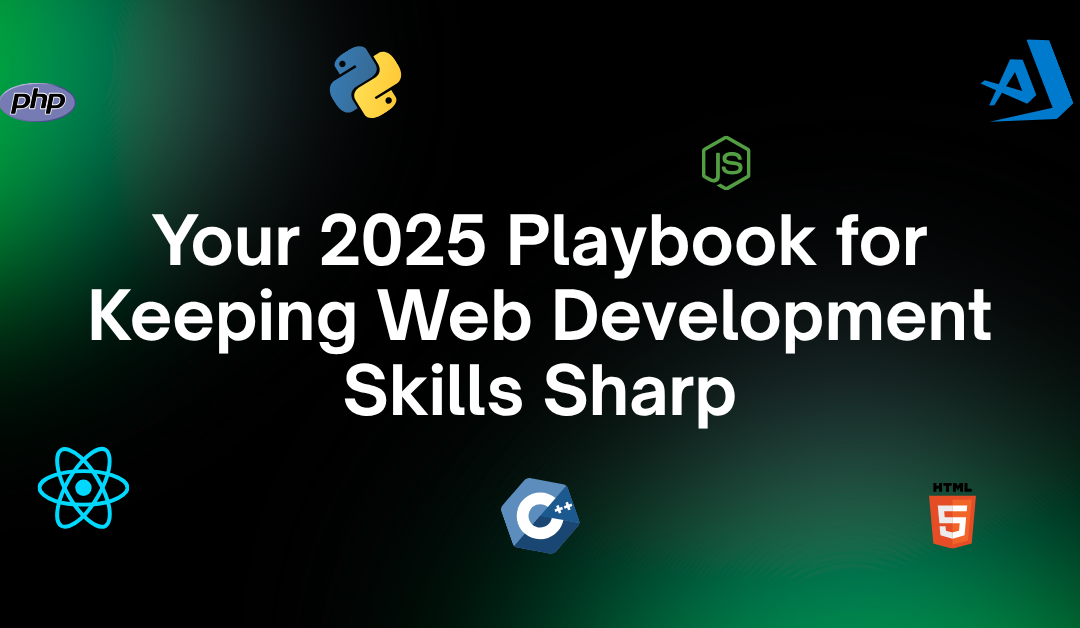The web development landscape is a dynamic place, constantly evolving with new frameworks, languages, tools, and best practices emerging at lightning speed. What was cutting-edge yesterday might be legacy code tomorrow. For developers, this presents both a thrilling challenge and a crucial necessity: staying ahead of the curve is no longer optional; it’s the bedrock of a thriving career.
Table of Contents
Key Strategies for Staying Ahead in Web Development:
| Embrace Community & Networking | Connect with peers and industry leaders. |
| Cultivate a Diverse Information Diet | Read, listen, and watch to stay informed. |
| Practice, Experiment, and Build Relentlessly | Hands-on application is key. |
| Stay Informed on Emerging Trends | Anticipate what’s next in the industry. |
| Be Strategic with Your Learning | Focus on fundamentals and niche expertise. |
Why Continuous Learning is Your Superpower in Web Development
Before we dive into the “how,” let’s understand the “why.” In 2025, the reasons for relentless upskilling are more compelling than ever:
- Career Longevity & Demand: Companies are increasingly seeking developers who are proficient in the latest technologies. Stagnation leads to obsolescence in a competitive job market.
- Enhanced Problem-Solving: New tools and approaches often offer more efficient and elegant solutions to common development challenges.
- Innovation & Creativity: Keeping up with trends fuels your creativity, allowing you to build more engaging, performant, and future-proof web experiences. Think AI-powered personalization, immersive UIs, and seamless PWAs.
- Increased Earning Potential: Developers with specialized, in-demand skills command higher salaries.
- Avoiding “Developer Burnout”: Engaging with new challenges and learning keeps your work fresh and exciting, preventing the monotony that can lead to burnout.
The 2025 Developer’s Arsenal: Strategies for Skill Advancement
So, how do you navigate this ever-shifting landscape and ensure your skills remain razor-sharp? Here’s my battle-tested guide:

1. Embrace the Power of Community & Networking
One of the richest sources of up-to-date knowledge and practical insights comes from your peers.
- Join Online Developer Communities: Platforms like Stack Overflow, Reddit (subreddits like r/webdev, r/reactjs, r/frontend), Dev.to, and Hashnode are goldmines for discussions, problem-solving, and discovering new trends.
- Participate in Local Meetups & Conferences: Whether virtual or in-person, these events offer opportunities to network, attend talks by industry leaders, and get hands-on with new technologies. Look out for events like Google I/O, Microsoft Build, and local tech meetups.
- Follow Industry Leaders on Social Media: Twitter (X), LinkedIn, and even YouTube are brimming with experts who share valuable tips, tutorials, and insights. Think about following figures like Wes Bos, Chris Coyier, Jen Simmons, and Addy Osmani.
- Contribute to Open Source Projects: This is a fantastic way to gain real-world experience, collaborate with other developers, and stay updated on the latest tools and best practices used in production environments.

2. Cultivate a Diverse Information Diet
Don’t put all your learning eggs in one basket. A multi-faceted approach ensures you catch various nuances and perspectives.
- Subscribe to Key Newsletters: Curated newsletters like JavaScript Weekly, Frontend Focus, and CSS-Tricks deliver essential updates directly to your inbox, saving you time.
- Dive into Blogs & Technical Publications: Beyond general web development blogs, seek out specialized publications focusing on specific frameworks, languages, or areas like performance optimization, security, or accessibility. Good examples include CSS-Tricks, Toptal Engineering Blog, and web.dev.
- Listen to Web Development Podcasts: Perfect for learning on the go! Podcasts like ShopTalk Show, Syntax.fm, and CodePen Radio offer engaging discussions and interviews with industry experts.
- Read Official Documentation: This is often overlooked but incredibly valuable. Frameworks like React, Angular, and Vue have extensive, regularly updated documentation that serves as the definitive source of truth.
- Watch Online Courses & Tutorials: Platforms like Udemy, Coursera, freeCodeCamp, and MDN Web Docs offer structured learning paths for all skill levels, from beginner to advanced. Even experienced developers can benefit from refreshing their knowledge or diving into a new area. YouTube channels like Traversy Media are also excellent.

3. Practice, Experiment, and Build Relentlessly
Passive consumption of information is not enough. True mastery comes from hands-on application.
- Build Personal Projects: This is arguably the most effective way to solidify new skills. Start small, pick a technology you want to learn, and build something – even if it’s a simple CRUD app or a portfolio site.
- Experiment with New Tools & Frameworks: Don’t be afraid to tinker. Allocate dedicated time each week to try out a new library, framework (e.g., Svelte, SolidJS), or tool (e.g., Tailwind CSS, Bun.js). Even if you don’t adopt them for long-term projects, the exploration expands your understanding of the ecosystem.
- Refactor Old Projects: Take a previous project and try to rebuild parts of it using a new technology or approach. This helps you compare and contrast, and often leads to deeper insights.
- Solve Coding Challenges: Websites like LeetCode, HackerRank, and freeCodeCamp offer a plethora of coding challenges that help hone your problem-solving and algorithmic thinking.

4. Stay Informed on Emerging Web Development Trends for 2025 and Beyond
Keep an eye on what’s on the horizon. Here are some key trends shaping web development in 2025:
- AI Integration in Web Development: Expect AI to play an even bigger role in code generation (think GitHub Copilot), automated testing, UI/UX design, and personalized user experiences.
- Progressive Web Apps (PWAs): With improved browser support and deeper integration capabilities (offline access, background sync, biometric auth), PWAs will continue to blur the lines between native apps and websites.
- Voice Search Optimization: As smart speakers and voice assistants become more prevalent, optimizing content for conversational queries and natural language will be crucial.
- WebAssembly (Wasm): For performance-critical applications, WebAssembly offers near-native speed, opening doors for complex computations and games directly in the browser.
- Headless CMS Architecture: The decoupling of the frontend and backend continues to gain traction, offering greater flexibility and scalability for content delivery.
- Serverless Architecture: Reducing infrastructure management overhead, serverless functions are becoming increasingly popular for backend logic.
- DevSecOps & Enhanced Cybersecurity: With growing cyber threats, integrating security practices throughout the entire development lifecycle will be paramount.
- Core Web Vitals Optimization: Google’s emphasis on user experience metrics like loading speed, interactivity, and visual stability will continue to influence SEO.

5. Be Strategic with Your Learning
You can’t learn everything. Be selective and strategic.
- Focus on Fundamentals: A strong grasp of HTML, CSS, and JavaScript is always relevant, regardless of framework shifts.
- Deep Dive into a Niche: While breadth is good, consider specializing in an area that excites you or is in high demand (e.g., a specific frontend framework, backend technology, or cloud platform).
- Timebox Your Learning: Avoid getting lost in a never-ending cycle of tutorials. Set realistic goals and time limits for exploring new concepts.
- Prioritize Learnings Based on Project Needs: If a new client project requires a specific technology, that’s a prime opportunity to dive in and learn it with a real-world application.
Your Journey to Web Development Mastery
Staying ahead in web development isn’t a one-time achievement; it’s an ongoing journey. By actively engaging with the developer community, diversifying your learning resources, consistently building and experimenting, and keeping an eye on future trends, you’ll not only keep your skills sharp but also solidify your position as a valuable and innovative web development professional in 2025 and beyond.

